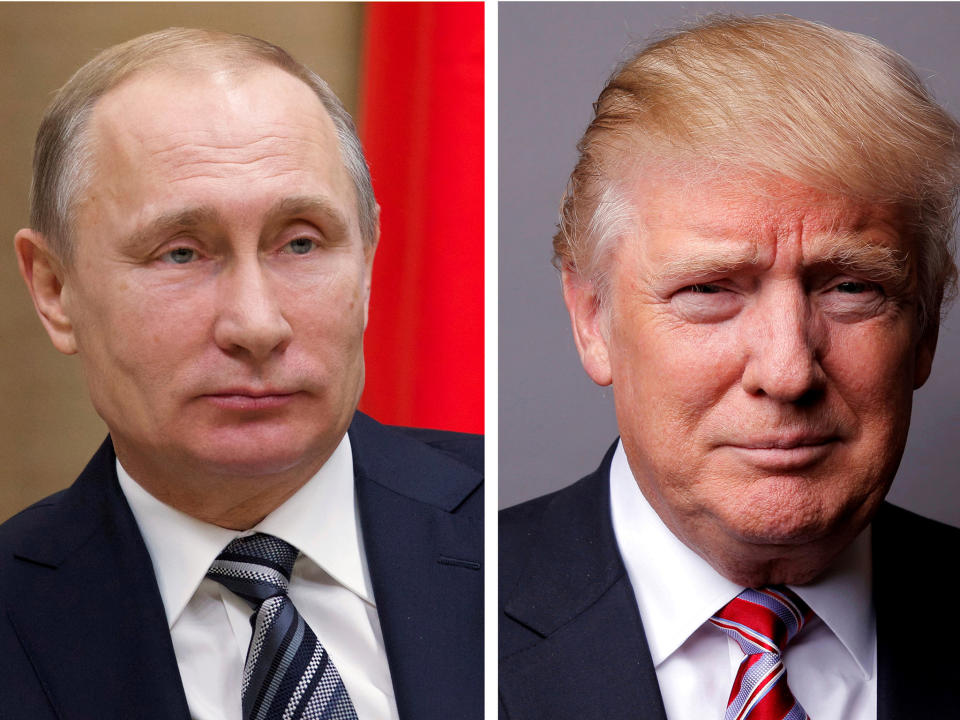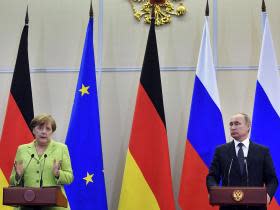Donald Trump and Vladimir Putin 'agree to work together on North Korea'
Donald Trump and Russian President Vladimir Putin have agreed to work together to make diplomatic progress on the threat posed by North Korea, following weeks of escalating tensions between the state and the US.
The White House said in a short statement on the call the two leaders spoke about the best way to resolve the "very dangerous" situation in North Korea.
The Kremlin said that Mr Putin and Mr Trump have agreed during a phone call to try to schedule a face-to-face meeting in Germany in July - around the G20 summit in Hamburg.
Read more
Merkel raises concerns with Putin over Chechnya 'torture' of gay men
Matthew Wallin, Senior Fellow at American Security Project said: "Russia’s influence will be helpful [on North Korea], but not nearly as much as China’s cooperation."
He said North Korean leader Kim Jong-Un needs to see that having functioning nuclear weapons is a bigger threat to the country's existence "than the threat of an American or South Korean invasion without them."
"Like China, Russia sees North Korea as a useful check on American power in the region", but Mr Wallin said it was "unclear" if either Mr Putin or Chinese President Xi Jinping are willing to put pressure on Mr Kim.
Moscow described the call as "business-like and constructive" with the two presidents also discussing the crisis in Syria.
The RIA news agency, citing the Kremlin, said that Mr Trump and Mr Putin would look to step up contact between US Secretary of State Rex Tillerson and Russian Foreign Minister Sergei Lavrov with the aim of intensifying diplomatic efforts over Syria.
Both statements are fairly "generic" on the hot-button issue according to Dr. Steve Sestanovich, who is a professor at Columbia University and a Senior Fellow at the Council on Foreign Relations.
Mr Sestanovich, also a former ambassador-at-large at the State Department, told The Independent that "the entire chemical weapons controversy is ignored [in the statements] - no UN Security Council resolution, no international investigation, no warnings against further use, no reference to any of the parties in the Syrian civil war."
The White House said that the conversation included an agreement that "all parties must do all they can to end the violence" in Syria, which is in the sixth year of a civil war that has also helped fuel the rise of terror group Isis.
However, Mr Wallin said it is "very unlikely we’ll see significant action on ending the suffering in that country" as a result of this call.
The White House noted the Syria conversation was "very good," where the two leaders discussed the creation of safe zones in the country and agreed that the suffering in Syria “has gone on for far too long.”
Mr Wallin explained that "the creation of safe zones without a plan to resolve the core issues of the conflict also risks perpetuating those safe zones." He said it would create "permanent refugee camps with no sustainable economy, and likely full of hunger, suffering, and recruiting opportunities for terrorists."
This is the first known discussion between the leaders since the US missile strikes against a Syrian government air base, however Mr Sestanovich said there was nothing in either side's statements that "suggests progress."


